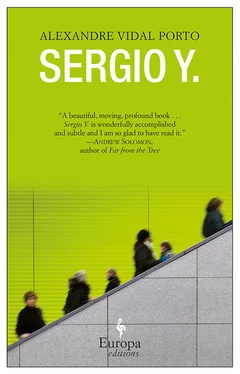The friendly tone intrigued me. What kind of woman was she? A doctor who specialized in transgender patients with the surname of an English banker. We agreed to meet on the afternoon of June 9th, on the eve of my return to Brazil.
I did not know it at the time, but the trip would offer me many lessons in humility: the realization that I was not as smart as I thought; the confirmation that I knew very little about Sergio Y. and that I had horribly underestimated him; the realization that the city was still there, but that the building where I lived on 102nd Street had been demolished and no longer existed. The realization that my daughter was an adult and no longer needed me. All of it, even when positive, was humiliating.
I would go to New York for my daughter’s sake and I would take the opportunity to learn more about a case that I had not known how to treat. Naively, I thought that knowing more about Sergio Y. would help me reduce the risk of bringing about a similar tragic fate to my other patients. By expanding my medical knowledge I could become a better human being. I thought that was the way out: the doctor in me had to save the person in me.
I confess my conversations with Eduardo had not fully redeemed me. I still carried feelings of guilt that were hard to shake. But I knew that in order to overcome this problem, I would have to transform my feelings regarding Sergio’s death into simple curiosity regarding the disappearance of someone I once knew. Self-preservation demanded I accept Sergio’s fate indifferently, as though there had never been anything between us.
In the days leading up to the trip, I was anxious. As the plane prepared for takeoff, I was filled with a mix of excitement and anxiety. I closed my eyes and breathed deeply, trying to relax. I saw Sergio, on his back, in a brick yard covered in snow; I saw blood coming out of his head and staining platinum-blond hair I had never seen; I could see red lipstick smudged on Sergio’s dead face. I could see the cooking school where he had studied with French chefs with mustaches and aprons covered in sheep’s blood.
I took an anxiolytic to relieve the stress. I removed my shoes, reclined my seat and put in earplugs. I began reading a magazine. I slept right through breakfast. I woke up, dazed, to the announcement that we were landing and to the noise of flight attendants scurrying up and down the aisle.
As the plane slowly taxied, I looked out the window, still groggy, trying to identify the logos of exotic airlines I never even knew existed.
Strangely, the line at immigration was short. I waited behind two other passengers. The agent just asked me how many days I intended to stay in the United States. That was it. She took my picture and my fingerprints, and with a heavy thwack she stamped and stapled my passport.
By 8 A.M. I was in a taxi on the way to the hotel.
For someone sensitive to smells, especially someone obsessed with cleanliness like me, a cab ride can be an uncomfortable experience. I always brace myself for unpleasant odors. Food, sweat, gases — the possibilities are endless.
My taxi, however, was clean and pleasant-smelling. I sat in silence in the backseat, looking out the window, fantasizing about the lives of the drivers and passengers in the other cars. Some sipped from thermos bottles — tea, coffee, whiskey? — while they drove. Some moved their lips, as if singing or talking into cell phones. Everyone looked ahead.
From his license, I could see the cab driver’s name was Dieudonné Pascal. At about the Midtown Tunnel, I tried to make conversation. I asked where he was from. He said Haiti. He did not react when I said Brazil. We drove in silence to the hotel on 57th Street between Fifth and Sixth avenues.
Luckily, I did not have to wait for a room. Mine was ready and I was able go straight up. There was a message from Mariana on my cell phone. I called her and arranged to have lunch at a Chinese restaurant on 93rd Street, halfway between her dorm and where I was staying.
We agreed to meet at noon. In my room, I ordered coffee and bathed sitting in the bathtub while holding the shower head in my hand. I shaved, got dressed and went out for a walk in Manhattan. It was sunny, but not too hot. I entertained myself with the scenery and ended up walking all the way from the hotel to the restaurant.
It had been one year since I had last seen my daughter. She told me of her new job, of the apartment she was thinking of renting, her plans to go to India for the wedding of her American boyfriend’s friend. It was as if we had never been apart.
I listened to her reasoning. We arrived at similar conclusions. I realized that my daughter was doing with her life the same things I would if it were my life. Our first conversation did me good.
This would be a short trip. I had to organize my time well. The graduation ceremony would be on Wednesday, in two days’ time. On Thursday, I would meet with Cecilia Coutts. On Friday afternoon, I would return to Brazil. I would have to be fast. I could not wait for things to happen. So, right after lunch, I made the first move in solving the mystery that was bothering me: I went to see where Sergio’s body had been found.
Objectively speaking, seeing the house in the West Village where Sergio Y. had lived and died should have made no difference whatsoever. Subjectively, however, the place where he had lived was an important element in contextualizing his existence in New York. I had imagined the type of neighborhood it would be, and even before going there, I could almost see the house at 12 Grove Street.
I thought of taking a cab but felt it would be more practical to go by subway. I got off at Union Square, and to enjoy the sunny day and remember my youth, I walked the rest of the way. On my walk, I counted down the street numbers and observed the people around me, block by block, until I arrived at my destination in the West Village.
Sergio lived the last four years of his life in this exposed brick brownstone. I wondered whether it had been his choice to inhabit the solemn building in front of which I now stood.
I passed my hand over the building’s short brown wall. I looked up at the stoop. I noticed the detail of the stained glass window on the door panel. I did not get the chance to see the garden in the back, but I understood where it was located. I imagined Sergio on a snowy day, walking down those steps carefully to avoid slipping.
He died two days after a blizzard blanketed the city and cut off power for hours. This image of winter and sensation of cold came to me on a summer’s day with students walking about the streets in T-shirts and flip-flops.
At night, I felt strange. I did not know if it was fatigue or the beginning of the flu. My body ached, my feet hurt, my legs hurt, and I felt very tired. Nonetheless I didn’t cancel my dinner plans with my daughter and her two college friends who she wanted to introduce me to.
I had a pleasant conversation over dinner with Victoria, an Argentinian from General Roca, and Tatiana, an Italian from Milan. I had fun. I forgot my physical discomfort. I returned to the hotel and fell asleep immediately. I did not even dream.
The next morning, I woke up very early. I stayed in my room reading newspapers online until about 9:30 A.M. I showered and went out to buy a dark blue blazer, which I would wear at the graduation ceremony. I also wanted to buy Mariana a ring.
Next, I wanted to go to a used bookstore near Gramercy Park to look for a book. On the way, I would pass by 23rd Street and visit the cooking school Sergio Y. had attended.
I went to the main office at the Institute of Culinary Education. The information I wanted, however, was protected by privacy laws, and I was not able to find out which courses Sergio or Sandra had taken. The only information they could give me freely was whether either of the two had ever been a student (yes, both had been students) and had graduated from the school (yes, Sergio Y. received two diplomas, in 2007 and 2008; Sandra Yacoubian received one in 2009).
Читать дальше












